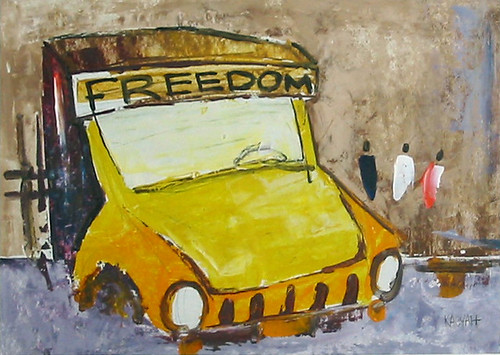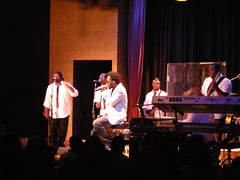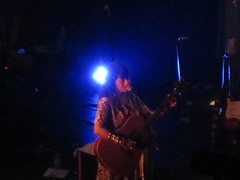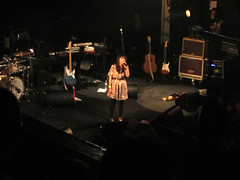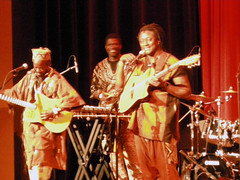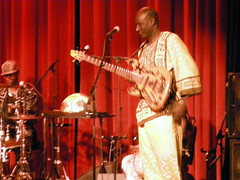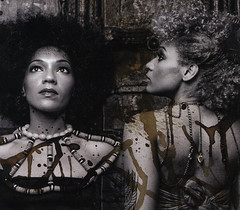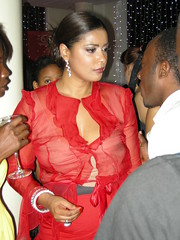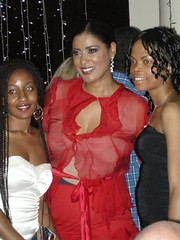My customary list of things that moved me in 2010...
Truth be told, I was mostly consumed by the World Cup last year especially since Ghana were bona fide contenders and could have/should have gone further/won it outright. Well the boys did great: Andre Ayew, Asamoah Gyan and all. I still haven't recovered from the Ghana-Uruguay match...
So, the year in numbers: I read 37 books, watched 100 movies (blame Netflix) and attended 12 concerts and 1 play.
I didn't write as much as I hoped and one reason is that I now also subscribe to about 1300 feeds; the resulting onslaught of information coming my way makes me lean towards consumption rather than production. Here's hoping for a different balance in 2011.
Books
Novels led the way in the 37 books I read (Incidentally two of these were e-books: Hilaire Belloc's essays and Charles Dickens's serial novels were great reads for the mobile phone moments, the interstices of modern life). The highlights in print were the young African writers.
- Nii Ayikwei Parkes - Tail of the Blue Bird
Call it a case of deep empathy; it was the shock of the familiar. It's not often that I recognize myself on the book shelves. It was bracing to read a young Ghanaian writer, a modern traveler, equally at ease in London, the US, and my childhood neighbourhoods in Accra, and even someone who'll head up to the mountains near Aburi and make them the setting for his novel. Nii Parkes loves language and plain storytelling. My friend isn't afraid to take his time and tell stories and let them take us where they may, with humourous anecdotes and elliptical discursions thrown in for good measure. The genre and the form - the crime procedural, are almost unimportant even if finely detailed, it's the underlying story that matters. We are children of Ananse, lovers of social living, and the stories we can share. I have a deep and specific connection with his artistic impulse even when I disagree with him. To cap things off, The Makings of You, his poetry collection finally got its release in the US. Needless to say my man had a great year. I dig his brand of toli and recommend it to you. A head nod in your direction, brother.
- Petina Gappah - An Elegy for Easterly
Brian Chikwava - Harare North
"They" kept saying that I should read the new crop of Zimbabwean writers, that life in the shadow of Robert Mugabe was proving to be a fertile artistic ground, that the future of African literature lay in their palms. And there was a lot to their argument, these two wrote of dark matters and it was a tonic to read them. With a blast of furious energy, their voices asserted themselves immediately. Where Gappah was wry and humanistic, Chikwava's tone was utterly bleak, filled with irony and the darkest humour. Mugabe's victims are manifold but we can always fall back on this artistic response to his reign.
Let me digress about book covers for a minute - as you may know I have an interest in the types and faces that represent writing about Africa. Consider the journey from the cover photo in the English edition of a London market
to the following illustration in the US Edition
"Fine", you say, there's a transformation from the photo of a street scene to a quite clever montage in the illustration that further manages to throw in a few more references to London: Big Ben, tube signs and all. "I get it".
But look closer, if you will, at the bottom corners of the latter, and note the giraffe on the right and the tree in the savanna that has materialized on the left.
Chikwava's book is a novel about Zimbabwean immigrants in London. True, there are plenty of predators in the book but they are all too human - there is no wildlife to be found in its pages. What scenes there are in Zimbabwe are all urban.
(Incidentally, I can understand that the same tree and savanna appear on the cover of Gappah's book since at least one of her stories has that kind of backdrop.)
Apparently it isn't enough to have Harare in the title, and the black head and anomic eyes of the main protagonist as a signifier; that would be too subtle an indicator of Africa. I wonder if that giraffe and savanna detail was part of the cover artist Yuko Kondo's initial vision or whether it was the publisher who needed to remove any doubt about provenance. I wonder, must every African novel face the world with wildlife or the savanna as its backdrop? I'm not a big fan of the safari quotient.
- James Ellroy - Blood's A Rover
I am a big fan of Ellroy's Underworld USA trilogy and the intricate worlds of bad men (and women in this final part) that he has constructed: "a new myth from the gutter to the stars". Indeed I read this twice in a feverish haze. He didn't disappoint; the trilogy will stand as one of the most ambitious and resolutely executed works of the past 20 years.
- Geoffrey Philp - Who's Your Daddy? and other Stories
Call it Jamaican Gothic, a collection of stories full of wit and perception. His roving eye and his sharply attuned ear for dialog make for vivid reading. I also happen to love Geoffrey Philp's poetry.
- Heinrich von Kleist - The Marquise of O and Other Stories
Luminous stories that linger in the mind. Plots that swirl every which way, with turns at once startling and engrossing. Writing that leaves you breathless, von Kleist was peerless as an artisan of literary tectonics.
- Geoffrey Household - Rogue Male
A story so stripped down and spartan that the reader wants to apply metaphor to gain comfort. On the surface it's a hard-boiled thriller about life at the extremes, I came to read it as a prescient warning about the relentless challenge that Hitler's fascism would pose. What is your interpretation?
- Meja Mwangi - Going Down River Road
A deep dive into the slums of Nairobi. An exacting and brilliant novel that manages to find soul and brotherhood among the futility. Gappah is to Chikwava - and Kenya is to Zimbabwe in our millennium - as Going Down River Road is to Thomas Akare's The Slums.
- Alain Mabanckou - Black Bazar
Reads almost like a follow-up of his 1998 tour de force, Bleu, Blanc, Rouge, wonderful writing all around.
See also: The Ways of The Porcupine
- Emmanuel Dongala - Johnny Chient Méchant
There's a fine translation, Johnny Mad Dog of this look at child soldiers and the damage they leave in their wake. I read also that it has been made into a film that is about to be released. I have a pending piece on the novels about child soldiers in Africa. Powerful stuff indeed.
- Sarah Ladipo Manyika - In Dependence
The Nigerian writers are making us all of us proud. I thoroughly enjoyed this love story full of missed opportunities.
Theatre
The sole play was Marcus Gardley's ... and Jesus Moonwalks the Mississippi, a funny gumbo of a play with soul food, slavery, Greek choruses, and Michael Jackson's Billie Jean song and dance routine at its core. Homeboy's got a unique vision.
Movies
Two trilogies brought forth the heat in my film watching.
- Carlos the Jackal
Olivier Assayas's take on that gremlin of terrorists featured a startling and dizzying performance by Edgar Ramirez as the eponymous Venezuelan revolutionary. There was no higher achievement in cinema.
- Stieg Larsson's Millenium trilogy saw Noomi Rapace embody that girl with the dragon tattoo with her singular talent. Actress of the year
- State of Play
This BBC Miniseries was so engrossing that we had to watch all 6 hours in one sitting. Fodder for those with the journalistic impulse.
- Prince of Broadway
Sean Baker's vibrant take on the hustle of Ghanaians in New York is almost too realistic.
- The Death Of Mr Lazarescu
Quietly devastating and Kafkaesque.
- The Secret of the Grain
I want to eat some couscous with everyone associated with La graine et le mulet.
- Boardwalk Empire and Treme
The Wife and I fell for these HBO series, what can I say.
- Bela Fleck: Throw Down Your Heart
A great documentary on musical exploration. For me it stepped into high gear from the moment when Oumou Sangare picked him up at the airport. I saw him in concert with Toumani Diabete the previous year; it was a great collaboration, banjo met kora and all was well.
Music
I attended 13 concerts - but only blogged about one - adding to the pile of lost reviews that I keep meaning to publish.
- Amel Larrieux
The highlight of my year was watching Amel Larrieux perform for two magical nights in August. I still have an orange glow from those sessions. Her 2006 album, Morning, has proven to be a fantastic bed of creativity, reinvented on stage. It was the album of the year in 2006 and, well, let me not beat around the bush, it is one of my two favourite albums of the decade - the other is Voodoo. The listening statistics seem to bear that out. The songs she previewed from next year's album ought to bring her to the wide acclaim she richly deserves.
- Van Hunt gave a solo performance almost exactly a year ago. He playfully alternated between acoustic guitar and grand piano and treated us to a tour of his soul songbook. It is deep and his musical vision is captivating.
- José James and Jef Neve For All We Know
José James - Blackmagic
Hands down the most romantic thing I did was to attend the concert José James and Jef Neve gave at the Gould Theater at the Legion of Honor in San Francisco. The classic setting, and the music, mon dieu, the music. I stand by my immediate reaction:
Impossibly talented, extravagantly empathetic, lushly lyrical: the golden voice meets the angular piano. Loved it.
It was really hard to believe that they had only played together twice before stepping into the studio. I'll have more to write about these young lions - José James especially (he had a busy year) deserves considerable critical attention, for this is the future of jazz.
- Dwele - Wants World Women
Dwele still has that swagger - he deserves it needless to say. This year in addition to the seductive poses he struck on stage - a Dwele concert in Oakland is an event to behold. He brought some social observation into the mix - as ever it was over an infectious beat. Consider his take on our ongoing Great Recession in How I Deal
See, I was employed
But not today
See Bush came and made all that go away
Now I'm the crib with the fakest grin
Waiting for Obama to kick in
The chorus starts aptly enough with "I'm losing my power, chasing the almighty dollar". With unemployment at 10 percent and underemployment pervasive, we are all "waiting for Obama to kick in".
- Bilal - Airtight's Revenge
In concert he was wild and fabulous and the new album was solid. It's great to have him back. The one-two combination of Restart and All Matter was exhilarating, Bilal went into a trance and we followed
- John Legend & The Roots - Wake Up!
These guys deserve the Grammys they will be getting in the next few weeks.
- Hindi Zahra - Handmade
We managed to catch Hindi Zahra live at Le Bataclan in Paris and thoroughly enjoyed ourselves. I guess you'd call it world music, it was worldly, grown folks music. Norah Jones watch out.
- Sharon Jones & the Dap-Kings - I Learned The Hard Way
How can one not love The Game Gets Old?
- Eric Roberson put the Music Fan First and continued to build his independent soul movement.
- Corinne Bailey Rae, mourning her late husband, found a way to sing again and released a set, The Sea, full of elegiac balladry.
- It was a year of returns. Massive Attack gave us Heligoland, Sade was a Soldier of Love and Gil Scott-Heron said I'm New Here - his take on Me And The Devil rocked hard.
Erykah Badu came back to us and even went nude for the love of the music.
Habib Koite and Bamada were mellow men as befits a band that has been together for 25 years. Like Sade, they were a seamless unit.
Finally two acts I caught at the end of the year who will be making waves in 2011:
- Les Nubians will be giving us a Nu Revolution in coming months. We caught them live as they readied a new stage show.
- I'm looking forward to Rhian Benson's Hands Clean, her first album in 7 years. Asked why she made us wait, she explained, "I had to do some living that I could then put in the album". She gave a short set at her release party in Accra - and even had a couple of wardrobe malfunctions, but it was worth it to hear her sing Say How I Feel and preview a few songs from the new album. Valentines Day is only weeks away.
Song of the year: Bilal - All Matter
Dearly Departed
In letters, Ferdinand Oyono, Robert Parker and gold old José Saramago passed away and are sorely missed.
In music, we lost Teddy Pendergrass - black masculinity incarnate, Gregory Isaacs - the cool ruler with the golden voice, Willie Mitchell one of the best music producers we have known, the ever versatile Lena Horne. The loss I took most personally was Abbey Lincoln; I'll forever miss her vibe.
For a playlist in memory of these greats, consider these albums: Joy, Night Nurse, Let's Stay Together and A Turtle's Dream.
File under: review, literature, appreciation, culture, observation, stereotypes, music, soul, movies, film, theatre, Africa, toli
